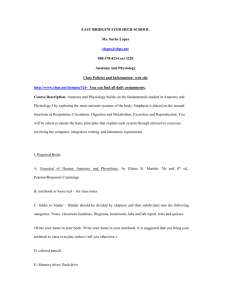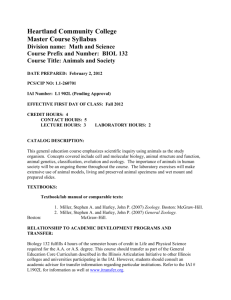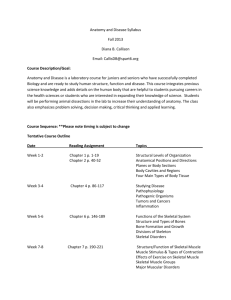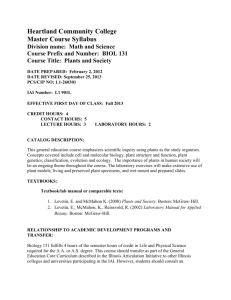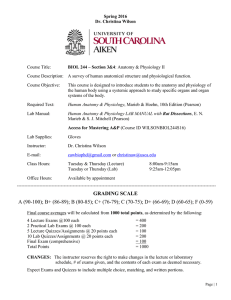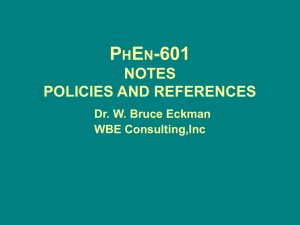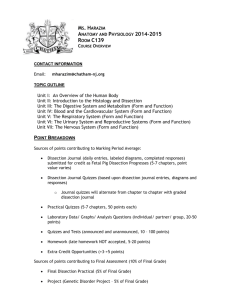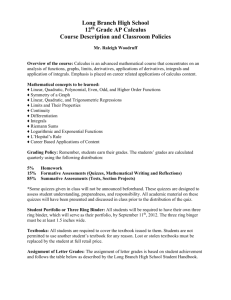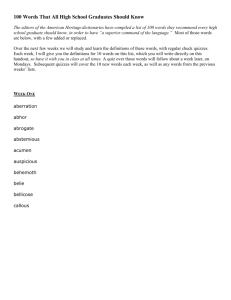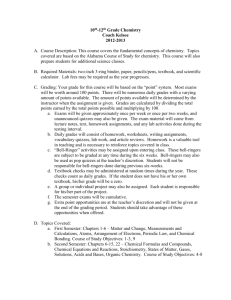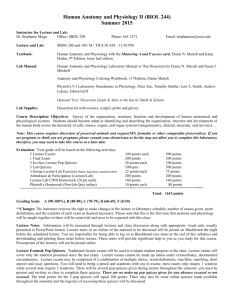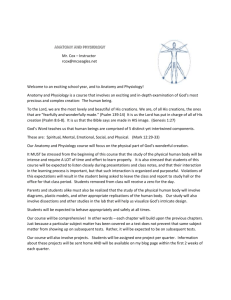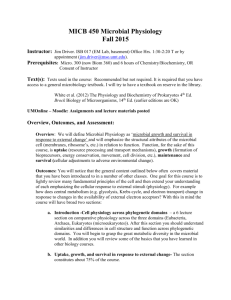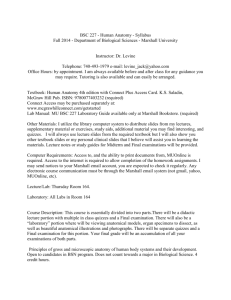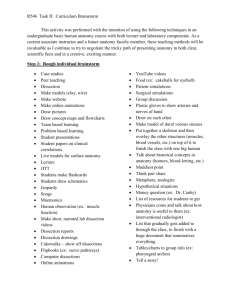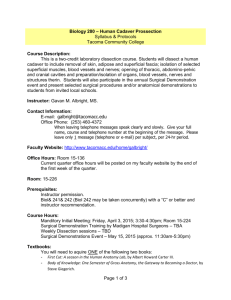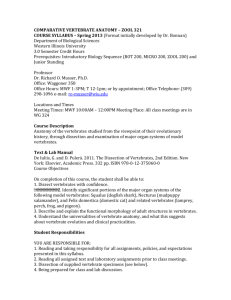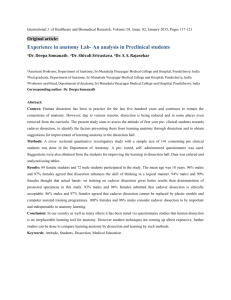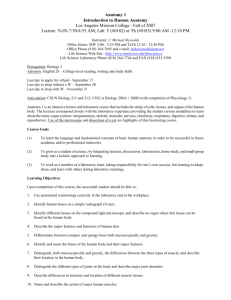Section SL3 (MTWR 4:00
advertisement
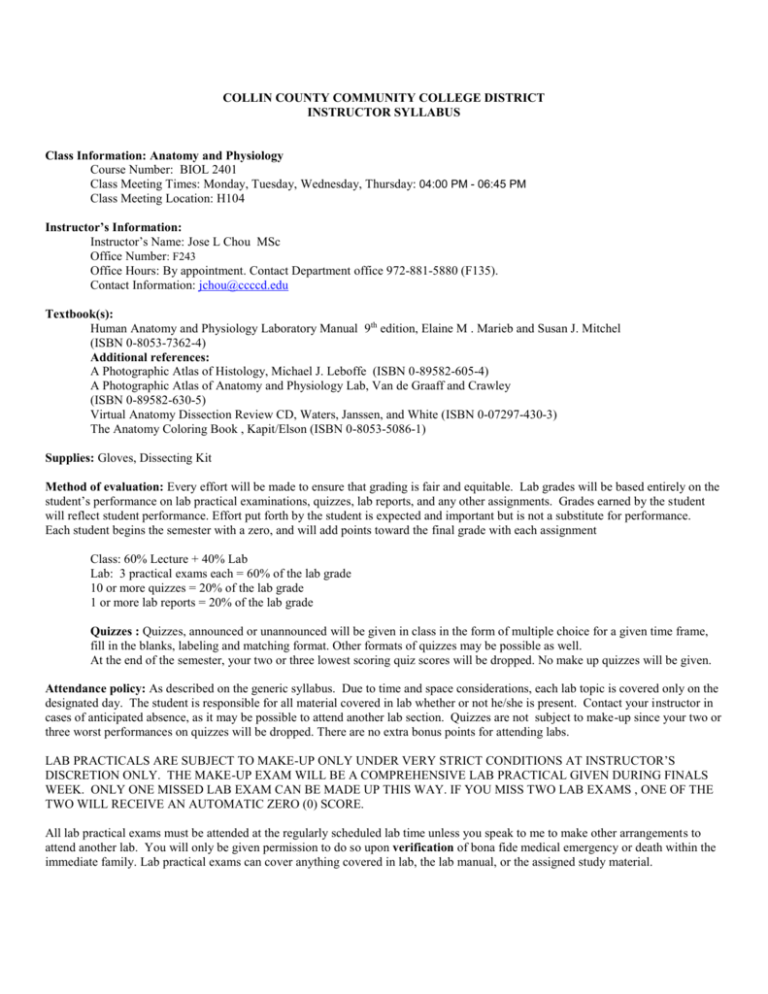
COLLIN COUNTY COMMUNITY COLLEGE DISTRICT INSTRUCTOR SYLLABUS Class Information: Anatomy and Physiology Course Number: BIOL 2401 Class Meeting Times: Monday, Tuesday, Wednesday, Thursday: 04:00 PM - 06:45 PM Class Meeting Location: H104 Instructor’s Information: Instructor’s Name: Jose L Chou MSc Office Number: F243 Office Hours: By appointment. Contact Department office 972-881-5880 (F135). Contact Information: jchou@ccccd.edu Textbook(s): Human Anatomy and Physiology Laboratory Manual 9th edition, Elaine M . Marieb and Susan J. Mitchel (ISBN 0-8053-7362-4) Additional references: A Photographic Atlas of Histology, Michael J. Leboffe (ISBN 0-89582-605-4) A Photographic Atlas of Anatomy and Physiology Lab, Van de Graaff and Crawley (ISBN 0-89582-630-5) Virtual Anatomy Dissection Review CD, Waters, Janssen, and White (ISBN 0-07297-430-3) The Anatomy Coloring Book , Kapit/Elson (ISBN 0-8053-5086-1) Supplies: Gloves, Dissecting Kit Method of evaluation: Every effort will be made to ensure that grading is fair and equitable. Lab grades will be based entirely on the student’s performance on lab practical examinations, quizzes, lab reports, and any other assignments. Grades earned by the student will reflect student performance. Effort put forth by the student is expected and important but is not a substitute for performance. Each student begins the semester with a zero, and will add points toward the final grade with each assignment Class: 60% Lecture + 40% Lab Lab: 3 practical exams each = 60% of the lab grade 10 or more quizzes = 20% of the lab grade 1 or more lab reports = 20% of the lab grade Quizzes : Quizzes, announced or unannounced will be given in class in the form of multiple choice for a given time frame, fill in the blanks, labeling and matching format. Other formats of quizzes may be possible as well. At the end of the semester, your two or three lowest scoring quiz scores will be dropped. No make up quizzes will be given. Attendance policy: As described on the generic syllabus. Due to time and space considerations, each lab topic is covered only on the designated day. The student is responsible for all material covered in lab whether or not he/she is present. Contact your instructor in cases of anticipated absence, as it may be possible to attend another lab section. Quizzes are not subject to make-up since your two or three worst performances on quizzes will be dropped. There are no extra bonus points for attending labs. LAB PRACTICALS ARE SUBJECT TO MAKE-UP ONLY UNDER VERY STRICT CONDITIONS AT INSTRUCTOR’S DISCRETION ONLY. THE MAKE-UP EXAM WILL BE A COMPREHENSIVE LAB PRACTICAL GIVEN DURING FINALS WEEK. ONLY ONE MISSED LAB EXAM CAN BE MADE UP THIS WAY. IF YOU MISS TWO LAB EXAMS , ONE OF THE TWO WILL RECEIVE AN AUTOMATIC ZERO (0) SCORE. All lab practical exams must be attended at the regularly scheduled lab time unless you speak to me to make other arrangements to attend another lab. You will only be given permission to do so upon verification of bona fide medical emergency or death within the immediate family. Lab practical exams can cover anything covered in lab, the lab manual, or the assigned study material. Lab practical examinations will be returned in class for a brief review. Thereafter, exams will kept on file in the instructor’s office and will be available for review. The student is responsible for scheduling time to review each exam within one week after lab practical examination grades are received. All issues regarding lab practical examination questions and grades must be resolved within one week after grades are returned to the class. Following the guidelines provided by FERPA, grades and/or grade information will not be given to anyone other than the student and will not be discussed over the phone. Discussion of grades via email will only be allowed if the request for such discussion is initiated by the actual student usin his or her cougar account email address. Course Withdrawal Policy: The last day to withdraw is 4/11. For withdrawal procedures refer to the college catalog. ADA statement: As stated in the generic syllabus. Classroom Conduct: Students are expected to speak and act in a respectful manner to their fellow students and the professor. Inappropriate conduct is any conduct whose intent or outcome results in the interruption or disruption of the learning process and includes talking while the professor or fellow students are talking, eating or drinking in the classroom, leaving early, arriving late, or participating in any activity during class that is unrelated to the classroom activity (reading newspapers or other extraneous materials, balancing checkbooks, etc.). All such activities are disruptive and counterproductive to the learning environment. Cell phones and pagers should be turned off or turned to vibrate before coming to class. If the student feels they have a possible exception (medical emergency, sick child, etc.) they should notify the instructor beforehand of a potential interruption, sit near the door, and exit the room quietly. If a student does not conduct himself/herself accordingly then he/she will be asked to leave the lab and possibly removed permanently from the course. ACADEMIC ETHICS The College District may initiate disciplinary proceedings against a student accused of scholastic dishonesty. Scholastic dishonesty includes, but is not limited to, one or more of the following acts: cheating, plagiarism, collusion, use of annotated texts or teacher’s editions, and/or falsifying academic records. Plagiarism is the use of an author’s words or ideas as if they were ones own without giving credit to the source, including, but not limited to, failure to acknowledge a direct quotation. Cheating is the willful giving or receiving of information in an unauthorized manner during an examination, illicitly obtaining examination questions in advance, copying computer or Internet files, using someone else’s work for assignments as if it were one’s own, or any other dishonest means of attempting to fulfill the requirements of a course. Collusion is intentionally aiding or attempting to aid another in an act of scholastic dishonesty, including but not limited to, providing a paper or project to another student; providing an inappropriate level of assistance; communicating answers to a classmate during an examination; removing tests or answer sheets from a test site, and allowing a classmate to copy answers. NOTE: A copy of the generic syllabus is available on the college web site at http://www.ccccd.edu/biology. Tentative Course Calendar WEEK 6/09 LABORATORY TOPICS Orientation, Protocol, Safety, Microscope, Anatomical Orientation, Terminology, Cell Review 6/10 6/11 Embryology, Epithelial Tissues Connective Tissues, Membranes Ex 44, Ex. 6 Ex. 6, Ex. 8 6/12 6/16 Muscle Tissue, Nervous Tissue Integumentary System Ex. 6 Ex. 7 6/17 *** Lab Practical I *** 6/18 Ex. 17, 18, 20 6/19 Nervous Tissue, Neurophysiology, EEG Brain Cranial Nerves (DISSECTION DAY) Spinal Cord 6/23 6/24 Spinal Nerves, ANS Human Reflex Physiology Ex. 21 6/25 Special Senses : Eye (DISSECTION DAY) Special Senses : Ear Special Senses : Smell, Taste General Senses 6/26 LAB MANUAL Exercises Handouts Ex. 1 - 5 Ex 6 Ex. 19 Ex. 22Ex. 24Ex. 25 Ex. 26 Ex. 23 6/30 *** Lab Practical II *** 7/01 Skeletal Tissue, Terminology, Skull Ex. 9, 10 7/02 Axial Skeleton, Appendicular Skeleton Ex. 10, 11 7/03 Appendicular Skeleton, Fetal Skeleton Articulation LAST DAY TO WITHDRAW – 7/03*** Ex. 11, 12 Ex. 13 7/07 Intro. Cat (DISSECTION DAY) Muscles (Human & Cat) (DISSECTION DAY) D1.1-D1.2 Ex. 15, D1.2-D1.9 7/08 Muscles (Human & Cat) (DISSECTION DAY) Ex. 15, D1.9-D1.13 7/09 Muscle Tissue, Muscle Physiology (DISSECTION DAY) Ex. 14, 16 7/10 Lab Practical III Exam – Last day of classes
